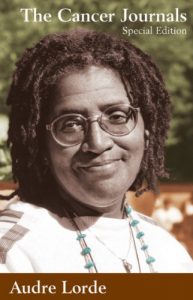Originally published in 1980, Audre Lorde's The Cancer Journals offers a profoundly feminist analysis of her experience with breast cancer and a modified radical mastectomy. Moving between journal entry, memoir, and exposition, Lorde fuses the personal and political and refuses the silencing and invisibility that she experienced both as a woman facing her own death and as a woman coping with the loss of her breast. After Lorde died in 1992, women from all over the U.S. and beyond paid tribute to her in essays and poems. Aunt Lute's special edition of The Cancer Journals gathers together twelve such tributes as well as a series of six photographs taken of Lorde by photographer Jean Weisinger. Tributes by: Margaret E. Cronin, Linda Cue, Elliot, Ayofemi Folayan, Jewelle Gomez, Margaret Randall, Adrienne Rich, Kate Rushin, Elizabeth Sargent, Ann Allen Shockley, Barbara Smith, and Evelyn White.
Grief, terror, courage, the passion for survival and far more than survival, are here in the personal and political searchings of a great poet. Lorde is the Amazon warrior who knows how to tell the tale of battle: what happened, and why, what are the weapons, and who are the comrades she found. More than this, her book offers women a new and deeply feminist challenge. —Adrienne Rich
Audre Lorde's The Cancer Journals has helped me more than I can say. It has taken away some of my fear of cancer, my fear of incompleteness, my fear of difference. This book teaches me that with one breast or none, I am still me. That the sum total of me is infinitely greater than the number of my breasts. —Alice Walker
Grief, terror, courage, the passion for survival and far more than survival, are here in the personal and political searchings of a great poet. Lorde is the Amazon warrior who knows how to tell the tale of battle: what happened, and why, what are the weapons, and who are the comrades she found. More than this, her book offers women a new and deeply feminist challenge. —Adrienne Rich
Audre Lorde's The Cancer Journals has helped me more than I can say. It has taken away some of my fear of cancer, my fear of incompleteness, my fear of difference. This book teaches me that with one breast or none, I am still me. That the sum total of me is infinitely greater than the number of my breasts. —Alice Walker






